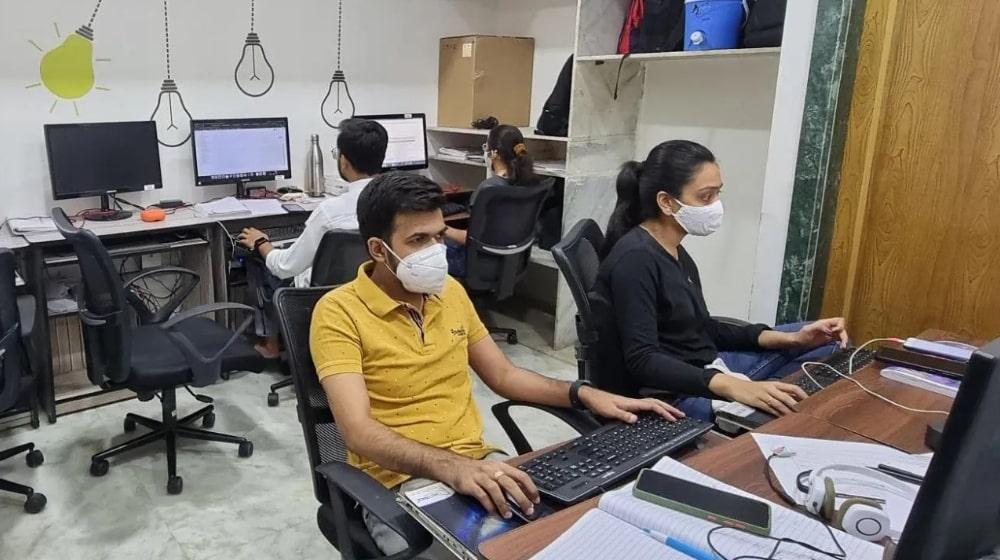A developer is someone who usually specializes in a specific set of programming languages. They are involved in building applications and creating software. Web developer jobs range from software developers to programmers, front-end developers and mobile developers.
In the digital age, web designing skills are gaining importance.
If you have expertise in any of these fields, we are happy to announce that everyone needs you!
Editor’s note: Check out the free tools from GoDaddy that help web developers manage multiple client accounts with ease.
Rising demand for developers
Hundreds of websites are created daily for various industries and niches. In this so-called modern era, everyone is expanding their online presence and reach. At the same time, creating a master website is a challenge for many small businesses.
This is why there are so many web developer jobs.
An intuitive and responsive website with a good user experience is a great way for startups to attract customers and become recognized in their industries. Many need a full-time developer to stay ahead of what competitors are doing.
Top 5 things to know before applying for a web developer job

According to the latest developer survey of CodinGame:
About 61% of HR professionals say finding qualified developers is the biggest recruitment challenge of 2021.
Often developers end up in jobs they never like. It is not entirely their fault, as everyone these days wants someone who is fully trained. No one wants to invest in a newbie.
Does that mean giving up on your career? No, you can remember and use these five things before applying for a job.
1. Choose your specialty
Newbies often find it challenging to get web developer jobs in a reputed company due to the lack of experience and expertise. Therefore, it is always advisable to work on a particular set of skills.
Build a specialty over one or a few things so that people looking for those skills will be likely to hire you.
For example, front-end developers specialize in taking a website design and doing the coding required to make it usable. UX/UI designers make sure that the finished website provides a good experience to those who use it.
Related: How to become a web designer
2. Build a solid portfolio
Once you know the field you are good at, it’s time to build a portfolio that no one can ignore.
The first thing anyone sees before hiring you is your portfolio.
A portfolio is more than an online resume listing all of your references and education. Being a developer, you should pay extra attention to building a stellar digital portfolio. This is your chance to impress potential employers with your skills.
Never say NO to any internships or projects.
One good way to build your portfolio is by donating your web development skills to a noble cause.
Work as much as you can till you are satisfied that you have a strong portfolio. Show potential employers that you have a lot to offer.
Related: 5 top programming languages every techie should know
3. Don’t rely on online courses
Do not rely on learning videos you search online like “How To Learn x."
Anyone you see on these random YouTube classes isn’t a professional developer unless you buy a masterclass. They can only teach you about the basic stuff, but in a real scenario, things work differently.
Many professionals feel that the best way of learning web development is through the process of doing it. If you are not practically approaching your work, you can never be sure of your skills.
Editor's note: One of the best ways to impress employers is by earning a certification from GoDaddy Academy. Taught online by industry experts, the video-based certification ends with a live project-based assessment.
4. Understand the market value
I believe in “knowing your worth before they decide a worth for you.” Before going for a job interview, always do your research about the market value of the company and how much they can pay you.
Websites like Glassdoor and PayScale can tell you how much web developers in your city are earning.
Researching about the market price helps you in shortlisting the companies that will work for you in terms of money.
5. Overcome the imposter syndrome
Most developers would admit to facing imposter syndrome at least once in their life.
Impostor syndrome refers to the feeling of having self-doubt about personal and professional achievements.
Developers always have the pressure to learn something every time. And when they don't know something, they start doubting their success and feeling insecure about it.
If you are someone who is trying to overcome imposter syndrome, understand that a developer can’t know everything.
Web development is just one career option. There are plenty of other fields too where a trained professional can get their hands on.
If you are not interested in web development, why not try:
- Mobile or game development
- Graphic designing
- CRM (customer relationship management) software
- Data science
The idea is to keep yourself open to other options that you might not have initially considered. Don't forget to believe in yourself and your skills to ensure success.
How to crack the interview
Getting a job depends on how you present yourself and how much potential the interviewer sees in you.
No one can give you a sure-shot method to nail an interview for a web developer job. However, keeping these points in mind can improve your chances of getting a dream job:
- Spark a meaningful conversation with the interviewer. Discuss your intent and thought process.
- Interviews can make anyone nervous and anxious. Being as clear and specific as possible can help you stay focused.
- Describe yourself, your passion, and your vision in a friendly but professional manner.
- It is not always right to nod on their ways of doing the job. If you have a better approach, it is okay to speak about it.
- The most important of all is asking questions. When you ask about the business, interviewers feel you are interested in the job and getting your head around it.

3 popular types of web developer jobs
Some web developers work on their own, while others prefer to work inside a larger company (aka in-house). There are three types of in-house developers that companies need:
1. Front-end developer
Front-end web developers are responsible for the “front part” of a website, or part that visitors typically see and interact with.
They integrate web design, markup languages, scripts and frameworks to create everything that future site visitors will see, click, and touch.
Web front-end developers have a special experience. They can encode interface design and encourage visitors to leave feedback that can be used to improve the user experience.
2. Back-end developer
A back-end web developer plays a key role in web development.
Back-end developers usually work behind the scenes or upstream.
They design and build the structure of the website and ensure that it works well. Some of their tasks include:
- Solving technical problems
- Integrating third-party services
- Simplifying data flow
- Improving the loading speed of web pages
3. Full-stack developer
Full-stack web developers can work on both the front and the back-end of a website.
They are often preferred by startups with limited resources as it is cheaper to pay a specialist for two different jobs.
Because they have a broader range of skills, they are generally in greater demand than front-end programmers and back-end programmers.
Final takeaways
Web developer jobs are likely to be in-demand for years to come. So if this is your field, you’ve made a smart choice.
Developers have amazing jobs. They can play with the codes, design, and create impressive softwares. As web development continues to grow and expand, keep learning, seeking new knowledge, and improving your skills. This is the way to ensure you will always have a job.
________________________________
Efficiently deliver better results
When you use the Hub from GoDaddy Pro, suddenly there’s more time in your day to focus on what matters most. Forget about juggling admin tasks. Reclaim your time and use it to make clients feel like the center of your universe.







